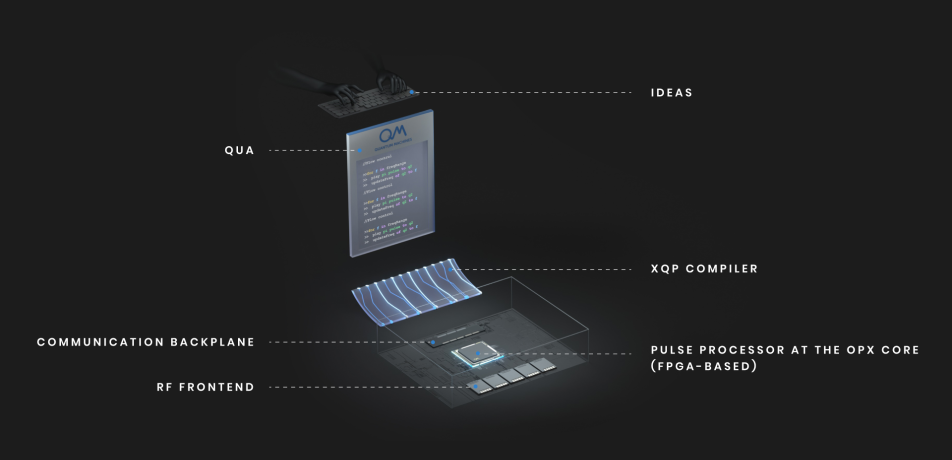Building the machines of the future
How Weizmann alumni are leading the quantum revolution, qubit by qubit
Alumni

X-ray view of Quantum Machines’ classical hardware system OPX+ with its signature Pulse Processor at its core.
When most of us hear the word “quantum,” our minds conjure up images of a futuristic world of science fiction. But what exactly is quantum computing and how will the imminent quantum era change the face of humankind and the technologies on which we so heavily depend?
We are all familiar with (to varying degrees) the binary bits that form the basis of classical computing—the 1s and 0s that, when strung together, can perform calculations faster than any human. Quantum bits—or qubits—however, have the potential to leave regular bits in the dust, thanks to one fundamental difference: while classical bits can either exist as a 1 or 0, qubits can exist as both, simultaneously. While that difference may seem insignificant at first glance, this characteristic would allow a quantum processor with less than 300 qubits to outperform a standard processor with more classical bits than the number of atoms in the universe. In other words, within a matter of minutes, a quantum computer would be able to make calculations that could take a traditional processor hundreds of thousands of years to compute.
According to Weizmann alumnus Dr. Itamar Sivan, the co-founder and CEO of Quantum Machines—a Tel Aviv-based start-up that is building the hardware and software infrastructures needed to run quantum machines—this reality is just around the corner.
Brains versus brawn
A former PhD student in Prof. Moty Heiblum’s lab in the Department of Condensed Matter Physics, where he investigated the interaction interference in quantum devices, and the co-founder of the Weizmann Institute Students Entrepreneurship Club (WISe), Dr. Sivan decided to combine his passion for physics and business, and teamed up with two other graduates from the Heiblum lab, Dr. Yonatan Cohen and Dr. Nissim Ofek, to launch Quantum Machines in 2018.
Quantum computers operate through an interplay of three components: quantum hardware, classical hardware, and classical software. Instead of focusing on the quantum aspect of this equation, like so many other companies, the team at Quantum Machines instead set their sights on building a new classical system.
“The field of quantum computing is booming,” Dr. Sivan says. “But we realized there was still a massive need yet to be met in the industry—namely, in order to realize the potential of quantum computing, a powerful classical system needed to be developed that could drive the quantum processors.”
The company soon built their Quantum Orchestration Platform—a comprehensive classical platform capable of running complex quantum algorithms and experiments. Using their innovative classical hardware system, OPX+, the platform is specially designed to meet the demanding requirements of quantum control protocols, such as precision, timing, complexity, and latency.
“You can think of the quantum processor as an extremely strong muscle capable of tremendous heavy lifting,” Dr. Sivan explains. “But even the strongest muscle cannot lift a grain of sand without a system—the brain—to operate it. And that’s what Quantum Machines’ technology is—the ‘brain’ that powers the ‘muscle.’ Until Quantum Machines, there was virtually no other group in the world that had been focused on developing a strong enough classical brain for this quantum muscle.”
Tech ties
The start-up has strong ties to the Weizmann Institute; not only are all three of its founders Weizmann alumni, but almost 10% of the employees are Weizmann graduates as well. Additionally, the technology developed at Quantum Machines—which is currently being used by nearly 100 companies in over 15 countries—can also be found in several chemistry and physics labs on the Weizmann campus.
“One of the great things about our product is that it’s scalable,” explains Dr. Sivan. “Which means it can address the needs of all sorts of labs, with all sorts of systems—from a one-qubit system, like the ones at Weizmann, to the biggest quantum processors there are.”
In breaking news, the company recently acquired Danish quantum computing leader, QDevil.
“We’re very excited to add the QDevil team to the Quantum Machines family,” says Dr. Sivan. “The addition of their unique expertise in auxiliary electronics and quantum hardware is a natural fit with our team, and will help us continue to accelerate the realization of useful quantum computers that are ubiquitous across all industries.”

From left: Quantum Machines co-founders Drs. Nissim Ofek, Itamar Sivan, and Yonatan Cohen
Credit to Ilya Melnikov, Haaretz








